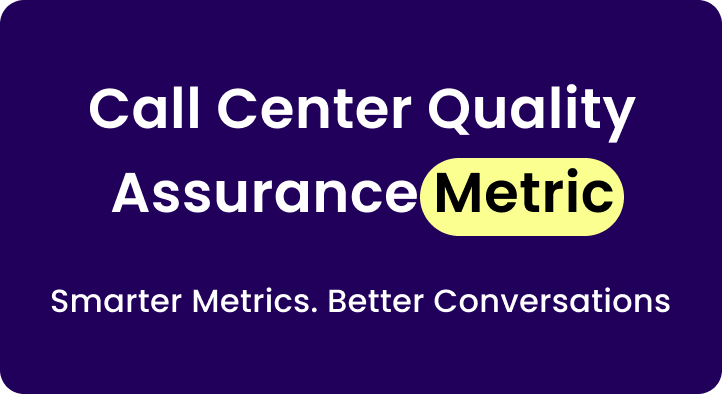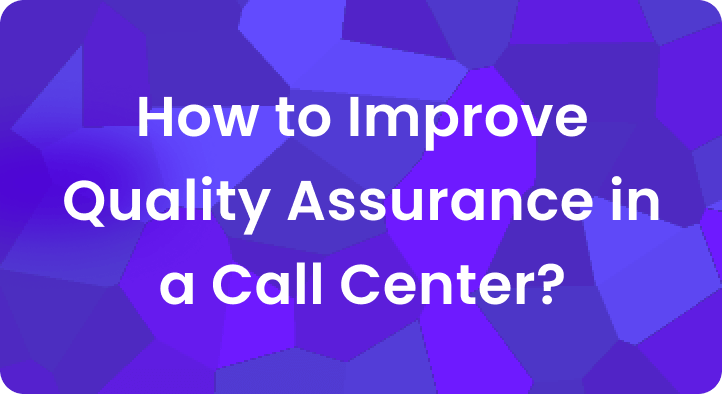TCPA Imagine this: Your customer just wrapped up a long day at work, and as he sits down for dinner, his phone rings. It’s yet another unwanted sales call.
Frustrating, right?
Now flip the script—what if your business is unintentionally responsible for those interruptions?
With over $200 million in TCPA -related settlements reported annually, non-compliance can be costly and damaging.
Understanding the Telephone Consumer Protection Act (TCPA) is essential for call centers to avoid penalties and maintain customer trust.
In this guide, we’ll explore the TCPA, why it’s crucial for call centers and actionable steps you can take to ensure compliance while optimizing your customer interactions.
A. What is the Telephone Consumer Protection Act (TCPA)?
The Telephone Consumer Protection Act (TCPA) is a U.S. law that protects consumers from unwanted telemarketing calls, automated calls, and unsolicited faxes. It sets rules for how businesses can contact people by phone.
Enacted in 1991, it regulates how businesses can contact you through phone calls, text messages, faxes, and even automated dialing systems.
Want to avoid those pesky robocalls? The TCPA requires telemarketers to get their written consent before calling.
It also bans calls to emergency lines, hospitals, and other sensitive numbers without permission.
But that’s not all! Telemarketers must provide an easy way for you to opt out during a call—no more endless calls after you’ve said: “stop.” Violators can face hefty penalties, with individuals able to claim up to $500 to $1500 per violation, tripled for willful misconduct.
Updated in 2012, the TCPA closed loopholes and strengthened consumer rights, ensuring you stay in control of your privacy.
B. Key provisions of TCPA
Understanding the core provisions of the TCPA is essential for compliance. Here’s a breakdown of its main rules:
1. Regulations on auto-dialers, robocalls, and text messages
Businesses are required to obtain clear, written consent from consumers before utilizing automated dialing systems or sending prerecorded voice messages.
The TCPA also treats text messages as equivalent to calls, demanding the same level of consent to contact consumers.
2. Calling time restrictions
To protect consumer privacy, businesses can only make calls between 8:00 AM and 9:00 PM, adhering to the recipient’s local time zone.
3. National Do Not Call (DNC) registry
Consumers can safeguard their privacy by registering their numbers on the DNC list, barring unsolicited calls unless prior consent is given or a pre-existing business relationship exists.
4. Restrictions on Automatic Dialing Systems (ATDS)
Using auto dialers for marketing calls or texts to cell phones, or other devices where charges might apply, is prohibited without prior written consent. Non-marketing calls via autodialers also require express consent.
5. Robocall limitations
Calls featuring artificial or prerecorded voices for marketing purposes are prohibited to residential or mobile numbers unless the consumer provides explicit written authorization.
6. Caller identification requirements
The TCPA mandates that callers clearly state their name, the organization they represent, and a callback number or address where they can be reached for further communication.
C. Implications of TCPA for call centers
Compliance with the TCPA isn’t just a legal obligation—it’s a strategic necessity. Here’s how it impacts call center operations:
1. Penalties for non-compliance
Not following the rules of the Telephone Consumer Protection Act (TCPA) can lead to significant financial losses.
Each violation carries a penalty of $500, which can rise to $1,500 for willful violations.
For businesses, this could mean millions of dollars in fines, especially in class-action lawsuits involving multiple consumers.
Beyond the financial hit, non-compliance can severely damage a company’s reputation, eroding customer trust and tarnishing its brand image.
2. Impact on outbound and inbound call strategies

Outbound calls
Call centers need to manage automated dialing systems (autodialers) carefully.
Using these systems without properly documenting the recipient’s consent can lead to violations.
Every call must comply with TCPA rules, ensuring recipients have opted in beforehand.
For example, consent must be explicit and cannot rely on vague agreements buried in terms and conditions.
Inbound calls
Even when customers initiate contact, call centers must tread carefully.
For instance, if calls are being recorded for quality assurance, businesses must inform the customer at the beginning of the call and secure their consent.
Non-compliance with these guidelines, even during inbound interactions, can result in penalties.
3. Common compliance mistakes to avoid
a. Failing to check the DNC registry:
Before placing calls, businesses are required to cross-reference their contact lists with the National Do Not Call (DNC) Registry.
Calling someone listed on the registry without prior consent is a clear violation.
b. Using auto dialers without consent:
Autodialers can’t be used to contact consumers unless the business has explicit, documented consent from the recipient.
Assumptions or vague agreements are insufficient—clear, written permission is a must.
c. Sending texts without opt-in mechanisms:
Promotional text messages require consumers to actively opt-in before being contacted.
This process must be transparent, with clear opt-in instructions provided upfront.
Neglecting to offer an opt-out option is another common mistake that can lead to compliance issues.
D. Best practices for compliance with the Telephone Consumer Protection Act
If you’re running a business that communicates with customers via phone or text, staying compliant with the TCPA is essential to avoid fines, lawsuits, and reputational damage.
Here are eight straightforward best practices to help you navigate TCPA compliance successfully:
1. Obtain proper consent
Before you make marketing calls or send text messages, you need the recipient’s explicit consent. This consent can be:
- Written (via an online form or physical signature)
- Verbal (document the details like date, time, and conversation summary)
- Implied (when a customer shares their phone number during a business transaction)
Written consent is required for marketing messages or automated calls. Your consent forms must always be clear and explain what the customer is agreeing to. Remember that customers can withdraw their consent at any time.
2. Honor the national Do Not Call (DNC) Registry
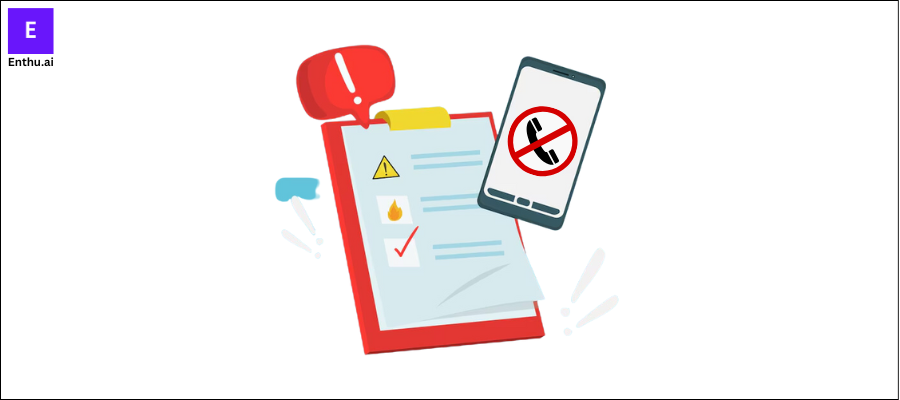
The DNC registry is a list of numbers from people who don’t want to receive telemarketing calls.
Before contacting anyone, cross-check your call lists with the registry.
Automating this process ensures accuracy and saves time.
Also, maintain your own internal do-not-call list for customers who directly request not to be contacted.
3. Adhere to time restrictions
Based on the recipient’s local time, you can only call consumers between 8:00 AM and 9:00 PM.
For businesses making calls across time zones, ensure your systems or agents adjust to the recipient’s location to avoid violations.
Calls outside these hours can result in hefty fines.
4. Provide an easy opt-out mechanism
Whether you’re making calls or sending texts, always allow recipients to opt out easily.
For example, let text message recipients reply with “STOP” to stop receiving messages.
Process opt-out requests promptly and ensure your systems update to avoid accidentally contacting them again.
5. Follow caller ID requirements
Transparency is key. Your Caller ID must clearly display:
- Your business name
- A valid phone number that recipients can use to call back
Avoid “spoofing” or falsifying caller information, as this violates the TCPA and the Truth in Caller ID Act.
6. Limit the use of auto-dialers and robocalls
If you’re using an automatic telephone dialing system (ATDS) or robocalls, ensure you have prior written consent.
Robocalls are heavily regulated, especially for marketing purposes.
Your system should also include a way for recipients to opt-out during the call (e.g., pressing a key to stop calls).
7. Keep accurate records of consent
Document everything. Maintain records of when and how you received consent, including:
- Time and date
- Method of consent (e.g., checkbox, verbal agreement)
- Any associated communication details
This documentation is your best defense against legal challenges or audits.
To manage and store these records, use reliable CRM or compliance tools.
8. Train your team and audit regularly

Educate your team about TCPA rules, including obtaining consent, honoring opt-out requests, and respecting time restrictions.
Regular training ensures everyone stays informed about compliance updates.
Periodic audits of your processes and systems can help you catch and fix any issues before they become violations.
E. How speech analytics and AI can flag potential violations
Speech analytics and AI-driven tools are transforming the way businesses monitor compliance.
These advanced technologies offer automated, real-time solutions to identify and mitigate potential TCPA violations, ensuring both adherence to regulations and improved customer interactions.
Here’s how they work in detail:
1. Call quality monitoring
AI-powered call center tools can analyze calls as they happen, listening for specific language, phrases, or omissions that may signal non-compliance. For example:
- Detecting if an agent fails to provide required disclosures, such as stating the business name or purpose of the call.
- Flagging aggressive or misleading language that violates ethical communication standards.
Call monitoring allows supervisors to intervene during calls, providing immediate corrections and preventing minor missteps from escalating into costly violations. This proactive approach enhances compliance and safeguards customer trust.
2. Conversation intelligence
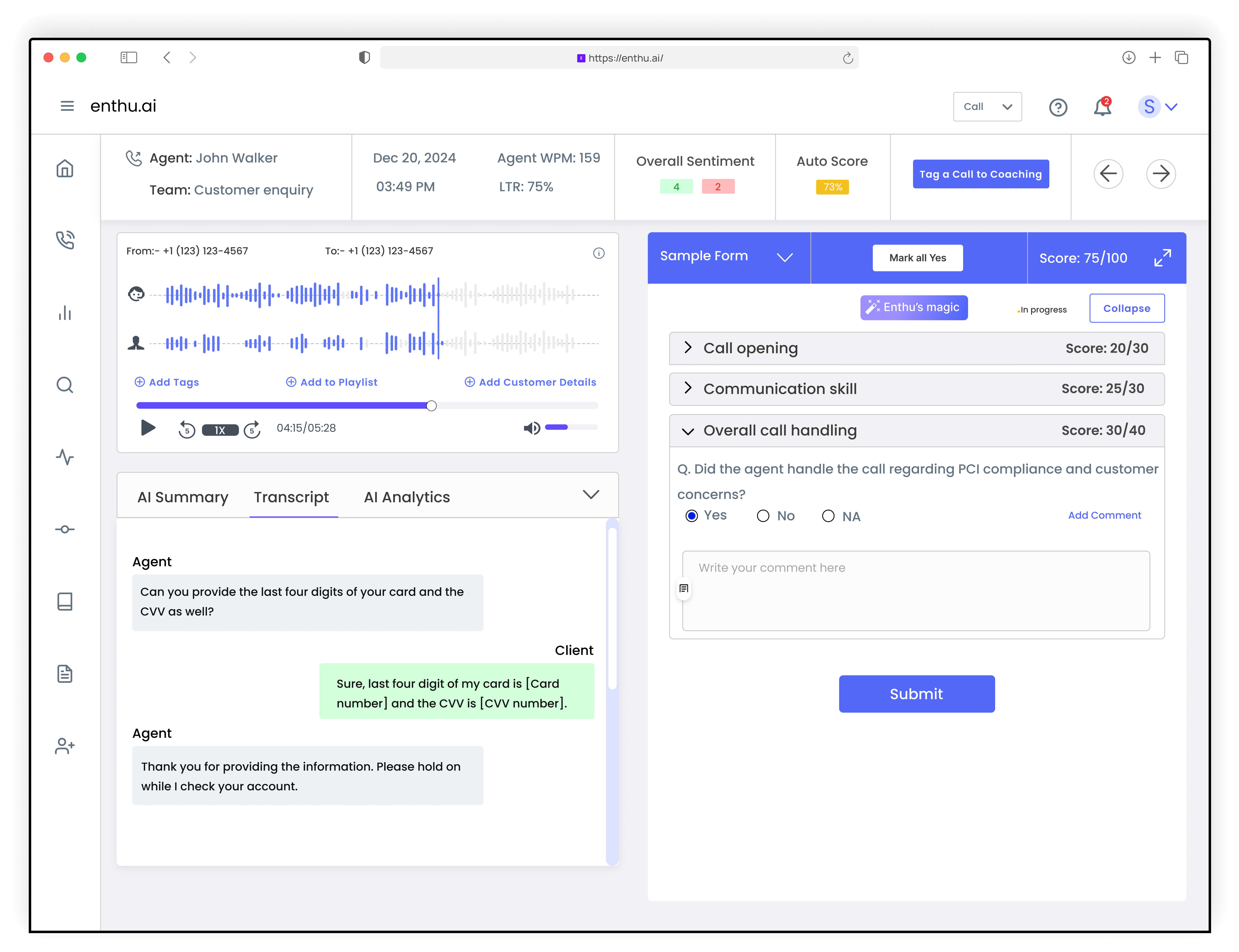
AI-driven conversation intelligence tools dive deeper into speech patterns, tone, and keywords to assess agent behavior and customer responses. Key capabilities include:
- Identifying instances where agents attempt to circumvent consent requirements, such as proceeding with a call despite an unclear opt-in from the recipient.
- Highlighting conversations that include risky phrases, like pushing for unauthorized sales or bypassing an opt-out request.
These insights enable businesses to address high-risk interactions and provide targeted coaching to agents, ensuring compliance while maintaining a professional and respectful tone with customers.
3. Proactive risk mitigation
By analyzing large volumes of call data, advanced analytics can uncover patterns or trends that might indicate underlying compliance risks. For example:
- Spotting a rise in customer complaints about unsolicited calls, which could signal a lapse in consent validation processes.
- Detecting frequent violations of time restrictions based on agent call schedules and customer time zones.
This proactive approach helps businesses address systemic issues before they escalate, enabling continuous improvement in compliance processes and preventing costly penalties.
4. Enhanced quality assurance
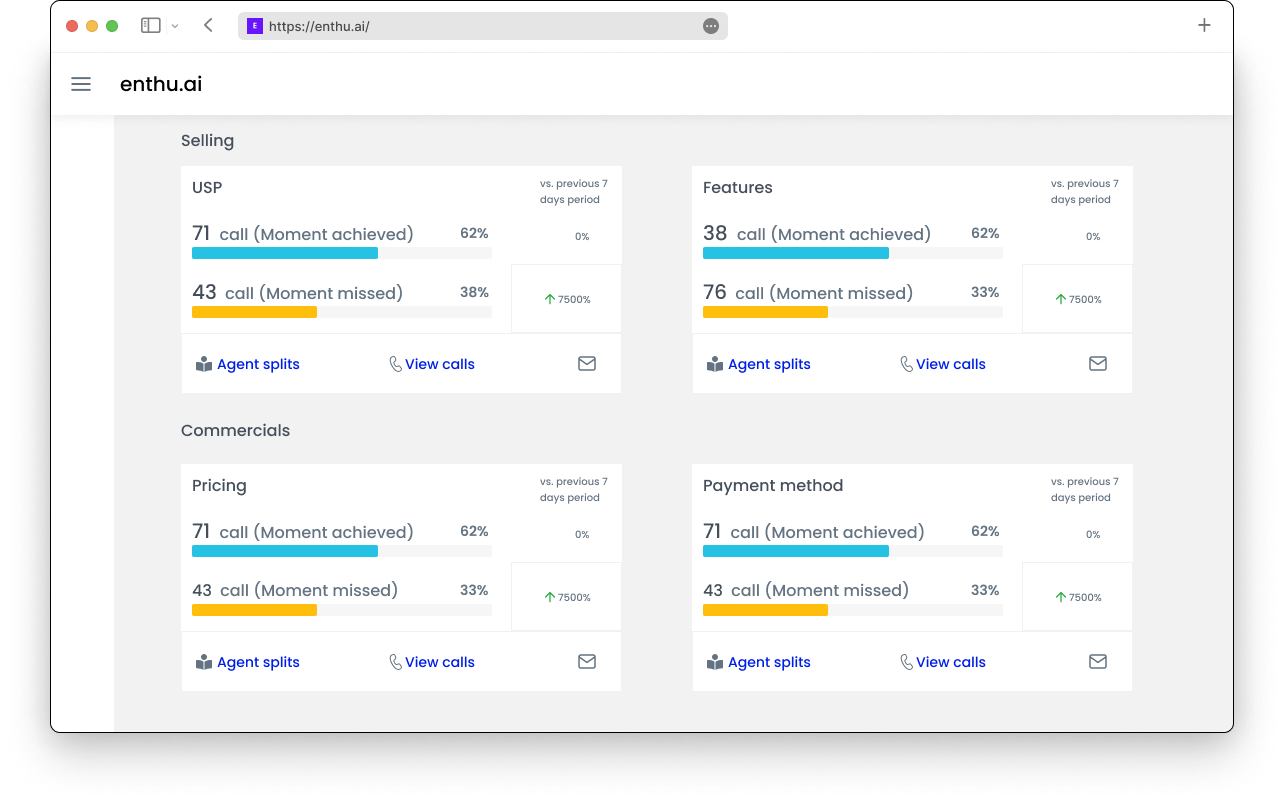
Integrating speech analytics into the quality assurance (QA) process automates and enhances agent performance evaluation. Features include:
- Automatically scoring calls for compliance with TCPA standards, such as honoring opt-out requests or adhering to time restrictions.
- Reducing reliance on manual call reviews can be inconsistent or prone to human error.
With automated QA tools, supervisors can focus on high-priority calls and ensure that every interaction meets legal requirements and company policies.
Conclusion
TCPA compliance may seem daunting, but you can turn it into a competitive advantage with the right approach.
Remember, non-compliance isn’t just a legal risk—it’s a threat to your reputation. Prioritize compliance today to protect your business and ensure sustainable growth.
By understanding the Telephone Consumer Protection Act, implementing best practices, and utilizing tools like speech analytics and AI, your business can ensure compliance while fostering customer trust and customer satisfaction.
Enthu.AI is advanced AI-powered speech analytic software that can help call centers ensure compliance, protect their reputations, and foster customer trust and satisfaction while driving sustainable growth.
FAQs
1. What does the TCPA do?
The Telephone Consumer Protection Act (TCPA) regulates telemarketing practices to protect consumers from unwanted communications. It establishes rules for phone calls, text messages, and faxes, requires prior consent, and enforces restrictions on automated dialing and marketing practices.
2. What is the function of TCPA?
The TCPA safeguards consumer privacy by setting legal standards for telemarketing communications. It limits the use of autodialers, ensures compliance with the Do Not Call registry, and mandates precise opt-in and opt-out mechanisms to protect consumers from intrusive marketing.
3. What is a violation of the TCPA?
A TCPA violation occurs when a business fails to follow regulations, such as contacting numbers on the Do Not Call registry, using auto-dialers or robocalls without prior consent, ignoring opt-out requests, or making calls outside permitted hours (8:00 AM–9:00 PM).
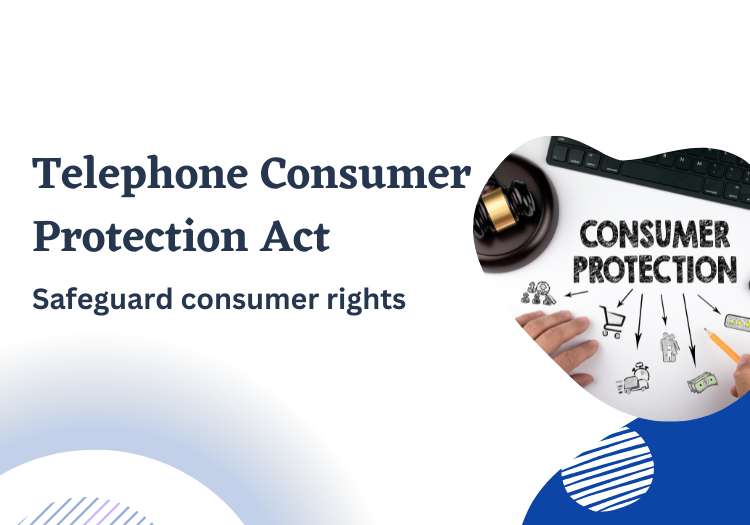


 On this page
On this page
